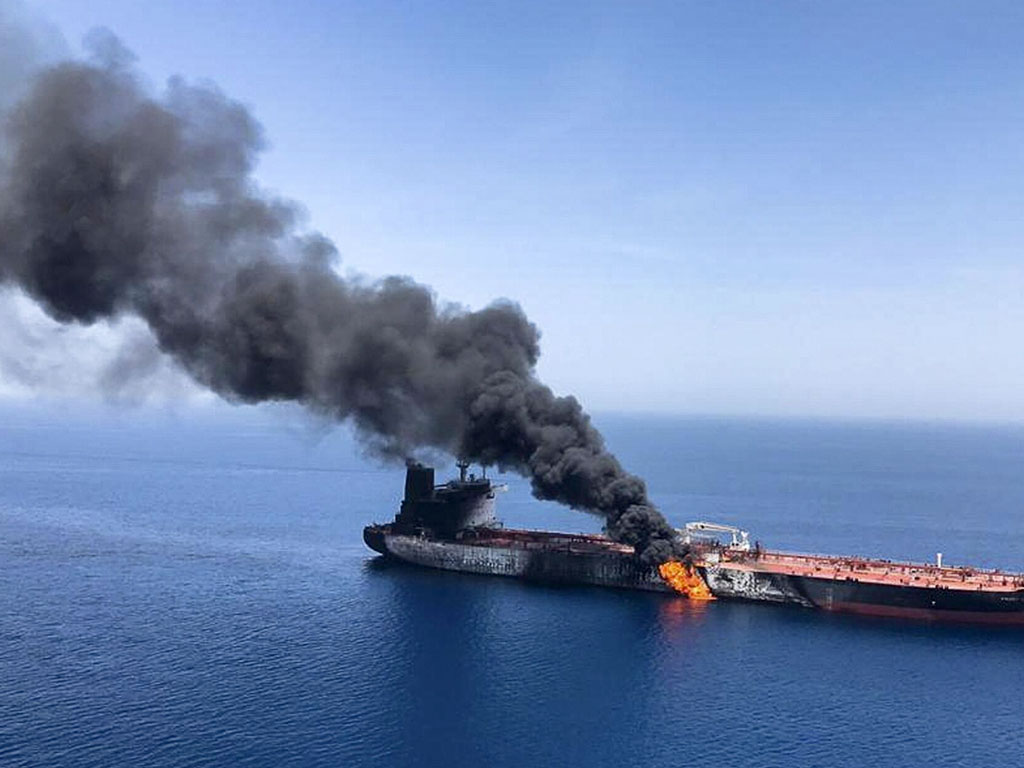Tension in the Gulf of Oman

The running feud between the United States and Iran has the inbuilt potential to explode into a military conflict, entailing certainty of disrupting oil supply to a number of customers, including some very close allies of Washington. One such customer is Japan, whose prime minister was right in Tehran when two oil tankers were attacked in the Gulf of Oman. Shinzo Abe was the first-ever Japanese prime minister on a visit to Iran since the advent of Islamic Revolution, arriving there a week after playing host to President Donald Trump. President Trump wants both war and peace with Iran: he dispatched nuclear-armed armada to the Gulf but also offered 'unconditional' peace talks to the Iranian leadership. There is no definite answer to the question who attacked these two oil tankers. While the US has blamed Iran for the attack on oil tankers the leadership in Tehran has "categorically" rejected it. Israel is the only country so far which has openly blamed Iran. Authenticity of the video aired by the US Central Command depicting the Revolutionary Guards "removing (an) unexploded limpet mine from the side of Kokuka Courageous following blasts" remains questionable as long as it is not supported by satellite imaging and other devices in space. The United States also claims that no proxy group operating in the region has the resources and proficiency to act with such high degree of sophistication. To this, the Iranian conjecture is that "somebody is trying to destabilise relations between Iran and international community". And also, why should the oil-producing Gulf countries create a situation which is likely to not only negatively impact their internal security but also bereft them of principal source of their economic strength. Agreed, Saudi Arabia has a tiff with Iran mainly because of their conflicting positions on the civil war in Yemen and its fallout. But a wider conflict is not in the interest of states on both sides of the Gulf - though its possibility cannot be ruled out. The governments in Tehran and Arab capitals know very well that within them there are elements who long for war in the region in order to promote their agendas against the existing governance patterns. It is therefore quite essential that the United States plus its key allies in the region and Iran desist from accusing each other; they are required to insulate their backyards in order to discourage the potential presence of non-state actors.
Should there be a military confrontation between Iran and the United States not only will the Gulf countries pay a heavy price, the world at large will also forfeit its much-expected recovery from the lingering global economic crisis. Many countries would like the United States to present irrefutable evidence in support of its claim that the Iranian government is responsible for the tanker attacks. By raising the ante of war in the Gulf the United States is perhaps trying to create justification for further sanctions against Iran - a plan many think is aimed at regime change in the Islamic republic. Therefore, nobody really thinks that either Iran or the United States wants a full-scale conflict; but it is also a fact that nobody doubts the capability of non-state actors and ideological lone wolves to set on fire the entire energy-rich region.
























Comments
Comments are closed.